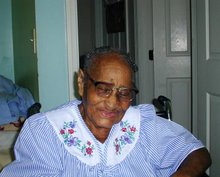One of the key reasons I started this blog was to provide a portal of information for caregivers of loved ones with Dementia and Alzheimer's Disease. My level of expertise is derived from my current role as caregiver for my grandmother. There are many care professionals who have made a career caring for Alzheimer's and Dementia patients. I am always thankful when I am able to receive nuggets of knowledge from those professionals.
Jean Bandos, MSN, RN, GCNS-BC Research Director at My Health Care Manager, is one such individual, whose wisdom on memory loss and caregiving I would like to share.
- Forgetfulness - not just forgetting names or appointments, but frequently forgetting doctor’s appointments, important anniversaries, birthdays and other special dates that would have never been forgotten in the past.
- Forgetting to the point that it causes confusion and interruption with daily activities.
- Forgetting to turn off the stove – we have all left a burner on accidentally, but if this is a frequent event or if the older adult does not remember cooking at all, then it is no longer a “normal” part of aging.
- Everyone experiences difficulties finding the right words, especially in stressful situations. It’s a bigger issue when an older adult cannot remember simple words and substitutes his or her own words making it difficult to follow what they are saying.
- Misplacing items is common for everybody, but it becomes a “memory problem” if the keys are found in the freezer or the ice tray is in the dryer.
- Finances – there is a problem if a senior has always kept an accurate checkbook in the past and now it never balances.
- Impaired judgment, such as dressing appropriately. This does not mean the senior is mixing plaids and strips, or purples and reds, but is caught wearing a bathrobe to the shopping mall or putting on several shirts instead of one.
- Medication with polypharmacy and drug interactions- if an older adult is on multiple medications and is experiencing memory issues, they should have a pharmacist or physician assess each medication.
- Infection- i.e. Urinary Tract Infection –is often a primary cause for memory decline. Urinary tract infection is the most frequent cause.
- Dehydration- not drinking enough water will cause memory decline.
- Emotional stress or depression – with the elderly a diagnosis of dementia is sometimes given when it is actually depression. If true depression is treated then memory should return.
- Pain is under-reported in elderly and causes a decline in memory.
- Alcoholism can cause serious memory loss.
- Memory loss- Key things to Remember:
- Be alert - document signs of memory loss and circumstances
- Notice if the memory loss is affecting activities of daily living such as planning, organizing and making decisions about every day functions.
- Keep record of all medications including prescriptions, over the counter, herbs, and vitamins
- Understand the difference between delirium and dementia
- Learn to identify and manage stressful situations
Jean is an experienced Gerontological Clinical Nurse Specialist with a vast expertise in care management of the older adult. My Health Care Manager is a national company that helps seniors and their families manage the complexities of older adult life with unbiased professional guidance related to health and independence. For more information and advice, please visit www.myhealthcaremanager.com or call My Health Care Manager’s network of nurses at 1-800-499-8020.

.jpg)







